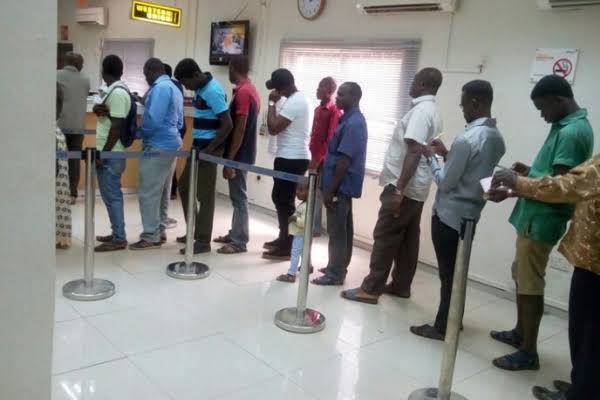Six Nigerian banks have posted N3.41 trillion as Profit After Tax (PAT) in 2024 against the N2.1 trillion recorded in 2023 financial year.
This is in spite of diverse transaction and service complaints, dissatisfaction among customers, and the challenging economic situation of the country.
The figure represents a 62.38 per cent increase from the amount recorded in 2023.
The banks’ 2024 audited financial statements posted on the Nigerian Exchange Group (NGX) platform showed that all the banks recorded increase in their gross earnings.
Their Profit Before Tax (PBT) also rose to N4.1 trillion in 2024, which represents 42.7 per cent increase compared to N9.61 billion recorded in 2023.
The banks analysed include Zenith Bank Plc, Guaranty Trust Holding Company (GTCO) Plc, United Bank for Africa (UBA) Plc, Fidelity Bank Plc, Stanbic IBTC Holdings Plc, and Wema Bank Plc.
The banks attributed the profit to equity holders, non-controlling interests, earning per share (basic and diluted).
As part of its earnings, GTCO announced a final dividend of N7.03 per share, which brought the total dividend for the 2024 financial year to N8.03 per share, against the N3.20 per share paid in 2023.
Zenith Bank proposed a final dividend of N4.00 per share in addition to N1.00 per share interim dividend, which amounted to N5.00 per share.
UBA proposed a total dividend of N5.00 per share, while Fidelity Bank proposed a final dividend of N2.10 per ordinary share, and Stanbic IBTC proposed a final dividend of N3.00 against N2.20 paid in N2023.
IMF appoints Tony Elumelu to Advisory Council on Entrepreneurship, Growth
Similarly, the banks’ donations to charitable and non-political organisations rose to N969 billion in 2024, compared to their N2.6 billion contribution in 2023.
However, there were still unresolved customers’ complaints recorded by the banks.
GTCO received 941,241 complaints and resolved 935,081, leaving 7,998 complaints unresolved, while UBA received 3,210,708 complaints and resolved 2,090,122 out of them, leaving 1,120,907 unresolved in 2024.
Zenith Bank has 203,787 complaints including the ones brought forward and resolved 202,384, leaving 1,403 unresolved.
Wema Bank received 783,461 and resolved 780,063, leaving 11,372 complaints unresolved, including the number carried forward (C/F).
Reacting to these headwinds, financial experts urged the Central Bank of Nigeria (CBN) to step up its monitoring and supervisory role to ensure that banks are not over-charging customers.
The President of the Capital Market Academics of Nigeria (CMAN), Prof. Uche Uwaleke, said the CBN’s Monetary Policy Committee (MPC) enabled a number of banks to increase interest income.
Uwaleke, on Monday, March 31, 2025, said interest income made lending rates to increase without commensurate increase in savings rates.
He said other factors which led to growth in banks’ profits exchange rate included the depreciation of naira, which made banks holding foreign denominated assets to benefit.
The CMAN boss stated: “There is the issue of the banking sector recapitalisation, which enables banks to raise some money from the capital market and invest in Information Technology (IT) infrastructure.
“It is very true that a number of banks, especially the tier 1 banks, are declaring huge profits in spite of the economic situation in the country.
“The reason is not far-fetched. If you recall, 2024 was characterised by a high interest rate environment.
Fidelity Bank records N385.2bn profit, investors to get N2.10 dividend
“The economy is still experiencing weak growth and we see that in virtually all the sectors, particularly the risk sectors of the economy, manufacturing, agric, did not really make any meaningful growth in 2024.”
Uwaleke, however, noted that the services sector had powered growth, adding that the banking sector is within the services sector.
Uwaleke said: “Now how do we really bridge this disconnect, this gap between the financial sector and the risk sector and how do we also ensure that the bank customers also begin to have a feel of the fortunes of banks, if one might put it that way?
“The CBN needs to really monitor and supervise the banks to ensure that they are not overcharging the customers.
“I know there is the recommended bank charges by the CBN for banks, but it is important for the regulator to ensure that customers don’t bear the brunt of some of the inefficiencies we see from some banks.”
Uwaleke, therefore, urged the CBN to advise banks to increase savings rates in tandem with lending rates.
- Kevin De Bruyne leaves Man City at end of season - April 4, 2025
- Commissioner: How Uba Sani revamped Kaduna health sector - April 4, 2025
- Supreme Court sacks Abure as LP national chairman - April 4, 2025








